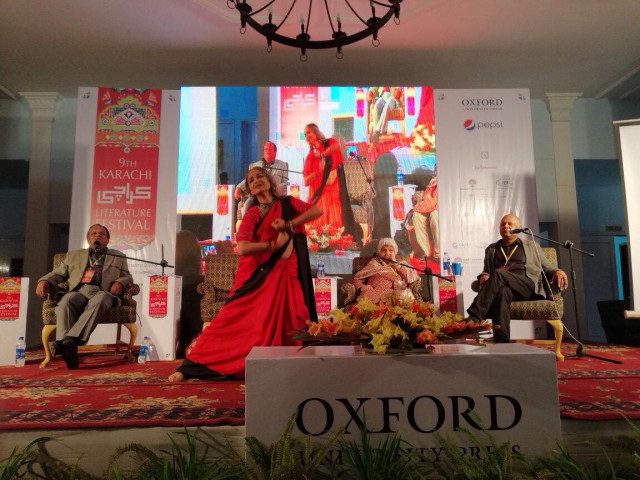'Poetry detached from suffering of the downtrodden never reaches greatness'
Luminaries of civil society discuss past, present and future of 'mazahmati adab'

PHOTO: EXPRESS
Renditions of Faiz Ahmad Faiz and Habib Jalib's poetry are still the hallmarks of modern revolutionary songs and slogans in political rallies are also derived from the two stalwarts' writings, speakers at a seminar highlighted on the last day of the Karachi Literature Festival (KLF).
#MeToo talk pushes aside issue of harassment
"Does the lack of replacements for Faiz and Jalib not represent a lack of focus on mazahmati adab amongst contemporary poets?" the session's moderator and anchorperson Mujahid Barelvi asked the panel of speakers which comprised poet Harris Khalique, classical dancer Sheema Kermani and educationist Arfa Sayeda Zehra.
"A poet's death does not imply the death of his ideas," Khalique retorted. "Besides, Faiz is not contemporary and modern poets come up with great stuff too, if the electronic media can ignore ratings and have enough decency to invite them," he added, mindful of the journalistic background of the moderator.
Fostering tolerance, one video at a time
Zehra, the most eloquent speaker on the panel and a fountainhead of knowledge on political activism and literature, also jumped on the media-bashing bandwagon.
"Agar ratings ikhlaq se giri hui cheezon ka naam hai toh mujhe nahin chahye [If one is required to stoop to unimaginable lows for ratings, then I don't want them]," she exclaimed.
Reverting back to the topic, Zehra said the roots of resistance literature lie in feelings of marginalisation and injustice that fuel protest movements.
"Ideas develop before their formalisation into literary forms of expression," she said, adding that in this way prominent poets come to reflect the views of the masses in ways more effective and long-lasting than dharnas.
From history to her story
Reminiscing about old times, Kermani narrated an incident where she danced on Faiz's 'Yeh kon Sakhi' without his permission. When, embarrassed, she told him, Faiz refused ownership of the literary classic, reminding her that it "belongs to the people".
This was followed by renditions of Pablo Neruda's 'I am explaining a few things' and Fahmida Riaz's 'Chadar Aur Char Divari' by Kermani.
The session was also interspersed with performances by her on classics including Jalib's 'Raqs Zanjeer' and 'Hum dekhen ge', the latter was in tribute to recently departed human rights activist Asma Jahangir.
Khalique also deplored the widening communication gap between modern poets and the 'mehnatkash' or hardworking sectors of society, blaming this for the drop in popularity of mazahmati adab.
The quest to encapsulate Pakistan cricket
Highlighting the close link between political thought and poetry of the great stalwarts, Barelvi narrated an incident where Jalib spontaneously composed two verses in response to Nawaz Sharif's promises of sacrificing his life for the people during a political rally.
"Jalib had come to visit me in the hospital. When he heard of the speech he retorted 'Na jaan de do naa zindagi de do, bus aik mill de do [Don't sacrifice your heart or your life, just give us one mill]'."



















COMMENTS
Comments are moderated and generally will be posted if they are on-topic and not abusive.
For more information, please see our Comments FAQ